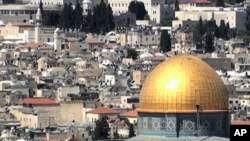2009 saw no resumption of the peace process between Israelis and Palestinians. Both sides are beginning the New Year at a stalemate over Israeli settlements in the occupied West Bank, and rising tensions over the status of Jerusalem.
2009 began with bombs and rockets as Israel launched a massive assault, Operation Cast Lead, aimed at stopping militants from firing rockets at Israel.
During the assault, militants from Gaza continued to fire homemade missiles over the border, exploding in communities of southern Israel.
The toll: more than 1,000 dead - all but 13 of them Palestinians, many of them civilians.
Early in the year, rightist former Prime Minister Benjamin Netanyahu made a comeback. He took office again with a promise to bring peace by boosting the Palestinian economy, not necessarily through negotiation.
The United States, under the new Obama administration, began a new push for peace. Washington sent U.S. special envoy George Mitchell to try to bring both sides back to the negotiations table. He made several trips during the year, each time returning to Washington with no deal in hand.
There were meetings on camera, including one in September when Mr. Netanyahu and Palestinian President Mahmoud Abbas shook hands on the sidelines of the U.N. General Assembly in New York. But there was no tangible progress, and no commitment from either side to return to talks.
Palestinian leaders said no talks can take place as long as Israelis continue to build on settlements in the West Bank and in East Jerusalem.
Palestinian Prime Minister Salaam Fayyad spoke in a VOA interview. "We want a political process to be launched, one that is credible enough, one that is strong enough, capable of delivering what we want the most, which is to bring about an end to this occupation," he said.
The Palestinian leadership is divided between the moderate Fatah faction that rules the West Bank and the Islamist militant group Hamas that controls the Gaza Strip. Fatah is losing support among a population impatient over the continued Israeli occupation.
President Obama raised hopes among many Palestinians when, in a speech from Cairo in June, he called for an end to Israeli settlement building. "The situation for the Palestinian people is intolerable. And America will not turn our backs on the legitimate Palestinian aspiration for dignity, opportunity, and a state of their own," Mr. Obama said.
Hope turned into disappointment among many Palestinians. Many were angered when Secretary of State Hillary Clinton - on a visit to Jerusalem - praised Israel's behavior. "What the prime minister has offered in specifics of a restraint on the policy of settlements, which he has just described, no new starts for example, is unprecedented in the context of prior-to negotiations," Mrs. Clinton said.
In November, an Israeli overture was made when Prime Minister Netanyahu offered a temporary settlement freeze. "Today, my Cabinet authorized a policy of restraint regarding settlements, which will include a suspension of new permits and new construction in Judea and Samaria for a period of 10 months," he said.
But Jewish settlers were a part of the voting bloc that brought Mr. Netanyahu to power. They have defied the ban and staged demonstrations against him, signaling a potential for more political turmoil in the coming year.
A senior political columnist for Haaretz newspaper in Tel Aviv, Akiva Eldar, says any Israeli overture has to be seen as genuine if it is to break the stalemate.
"I can not expect the Arabs to make any move that I do not expect or I do not demand the Israelis to do. It has to be reciprocal and symmetric," Eldar stated.
Israel continued its policy of encouraging economic growth in the West Bank by removing checkpoints and facilitating the flow of people and goods, triggering an economic boom. But the Palestinians want a state of their own, without Jewish settlements, and sooner than Israel seems willing to deliver. In 2009, they threatened to declare statehood unilaterally.
The year ends with the gap between Israelis and Palestinians as wide as ever.
News
A Year of Stalemate, Dashed Hopes in Israeli-Palestinian Conflict
- By Luis Ramirez
update

Israelis, Palestinians Look For New Approaches to Peace



